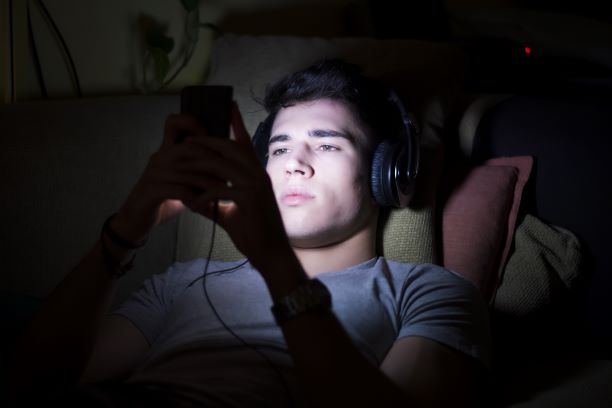Research shows that use of electronics pre-bedtime can affect sleep. A recent study of college students’ use of Cell Phones after “lights out” was shown to definitively contribute to sleep disturbances and mental distress.
This was a large, significant group of almost 4,400 college students self-reporting cell phone use and specifically, use in bed after “lights out”. The pre-post testing took place over 8 months and measured many variables. Excessive cell phone use was defined as 4 hours per day or above.
To most of us, this does not seem excessive, but it was considered excessive in this research. Excessive cell phone use was positively associated with sleep disturbances and mental distress scores at follow up (8 months…a great long-term study).
They also looked at the results when the students stopped using the phones after lights out, the symptoms declined back towards baseline measures of normal sleep and distress…that’s good news!
84% of students (college) used their phones every day (4+ hours) and compared it to adolescents (junior high) excessive use (2+ hours/day).
The study also compared the effects of Melatonin secretion (great study) when the cell phone was used pre-bedtime VS after “lights out”. Melatonin is a hormone that is secreted as the sun goes down and helps “ready” the body for sleep. Use of the cell phone pre-bedtime decreased the initial amount of melatonin secretion, but it “caught up” over the night….it was delayed and slowed…which would disturb sleep onset and perhaps initial quality of sleep. After lights out there were EEG changes and delayed melatonin secretion.
Of interest, they also commented on texting VS talking. If conversations are emotional, thoughtful, or considerable they contribute to insomnia because of the release of emotional hormones. Text doesn’t require the sender or receiver to be ready for the communication, and a response may be well after the sender’s “purpose” has been forgotten. That could re-engage or excite hormonal release. Texting is far more common than talking for “convenience” and (my opinion) doesn’t require as much emotional engagement with all topics.
Overall, this was interesting in that Text messaging after “lights out” had a negative and statistical effect on sleep quality, duration, anxiety, insomnia.
Take Away: put the phones in another room pre-bedtime and leave them there until morning. Your brain will thank you for it!!
Sleep Research Society. The associations of long term mobile phone use with sleep disturbances and mental distress in technical college students: prospective cohort study. Published in SLEEP, zsy213




